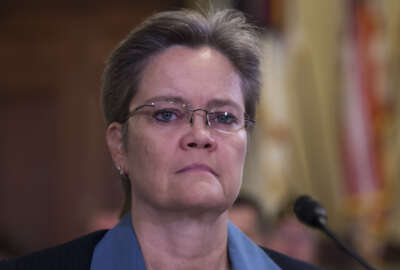
VA leader launches investigation to reconsider disciplinary actions against 4 senior execs
Department of Veterans Affairs Deputy Secretary Sloan Gibson has launched an investigation to determine whether or not he will seek different disciplinary actions...
The Department of Veterans Affairs’ second-highest official is launching an investigation to determine whether four senior executives at the agency should be disciplined for what a watchdog report claimed was taking advantage of a relocation program.
In a call with reporters on Feb. 2, VA Deputy Secretary Sloan Gibson said he had already issued orders for an investigation to review the actions of Diana Rubens and Kimberley Graves, senior employees who were demoted by the department for abuse of power but who have both since been reinstated by Merit Systems Protection Board judges.
Gibson said the investigation will take one week, and once evidence is collected he will review it and consider whether or not to take action against Rubens, Graves, and Principal Deputy Undersecretary for Benefits Danny Pummill and Beth McCoy, deputy undersecretary for field operations and Rubens’ assistant.
“We now find ourselves in a situation where both Rubens and Graves have been charged, and those charges have been sustained and there’s been no penalty. I do not believe that was the intent of Congress. I don’t believe it’s the right thing for veterans. So I will impose some penalty,” Gibson said. “What you see in both of these two judges’ findings, is that the issue was an issue of disparate treatment. As I take a fresh look at all evidence that’s available to me, as it relates to McCoy and Pummill, if I find a similar set of circumstances and charges, then I have to view those in the same context that I view Rubens and Graves. I can’t decide one thing for Rubens and Graves and something else for Pummill and McCoy to the extent that the evidence supports a comparable set of circumstances or comparable level of misconduct.”
Both women were named in an inspector general’s report issued Sept. 28. The IG report stated that Rubens and Graves inappropriately coerced two other directors to leave their positions when they were not interested in leaving, so vacancies would be created for Rubens and Graves and the government would pay roughly $400,000 for them to relocate within the department.
Gibson said when the IG published its report, auditors left out a “vast amount of exculpatory evidence” in the evidence file and claimed the IG “picked and chose pieces that they put in their report in order to support a conclusion that they wanted to reach.”
Rubens was moved to VBA’s Houston regional office to serve as an assistant director, according to the Associated Press. Graves is an assistant director in Phoenix.
In her decision for Graves, MSPB Chief Administrative Judge Michele Schroeder wrote that “not only did Mr. Pummill have full knowledge, but his Inspector General testimony and the admissions of the agency indicate he not only fully supported the actions but thought they were in the best interest of the VA and veterans, at the time the actions occurred and now.”
“There was no evidence whatsoever that at any point Mr. Pummill said, ‘time out everyone, this doesn’t look good.’ Or to be more articulate, Ms. Graves and/or the agency are creating the appearance of an impropriety because she was the recommending official as to Mr. Waller’s reassignment to Baltimore and she is now taking his prior position,” Schroeder said.
In his decision for Rubens, MSPB Chief Administrative Judge William Boulden determined that McCoy was in the same boat as Rubens.
“McCoy facilitated [Rubens’] reassignment by recommending approval of the final matter to be resolved before [Rubens] could be reassigned. Once [Rubens] was reassigned, McCoy stepped into [Rubens’] former position with a sizable pay raise,” Boulden stated. “This creates the precise appearance of impropriety which [Rubens] created. Therefore, like [Rubens], McCoy should have recused herself. Additionally, as an aggravating matter, McCoy, unlike [Rubens], actually pressured Waller to go to Baltimore.”
Asked whether he thought Rubens would return to her post in Philadelphia or if he would move her elsewhere based on the past few months of scrutiny and press, he said that was a decision he had not yet made.
“We’ve taken two good people, they made an error in judgment and the judges have upheld that. These are good people that can make a difference for the veterans that we serve day in and day out, and their reputations have been trashed. There are people that took this IG report, rolled it up and beat everybody over the head with it. This became a media sensation and quite frankly, I think it’s a disgrace to the process that that is allowed to happen.”
Rep. Jeff Miller (R-Fla.) has been one of the loudest voices calling on VA reform, and he led some of the hearings involving the relocation program.
In a statement from his office, Miller said the judges’ decisions prove two facts:
“VA isn’t consistently and fairly holding employees accountable and — contrary to the repeated assertions of department officials — VA leaders do not have the authority they need to swiftly discipline misbehaving employees.”
Gibson said that he did not believe it was Congress’ intent in crafting the Choice Act to have a situation where charges against senior executives are upheld but the employees are not punished.
“What the judge said was that the penalty imposed was unreasonable. And I am going to interpret that as being exactly what that is,” Gibson said. “And again the second judge really opened the door here, by saying if he had the authority he would impose a lesser penalty. I think that’s the intent here. I am not going to be so narrow here so as not to follow this all the way through to its logical conclusion.”
Copyright © 2025 Federal News Network. All rights reserved. This website is not intended for users located within the European Economic Area.
Related Stories





